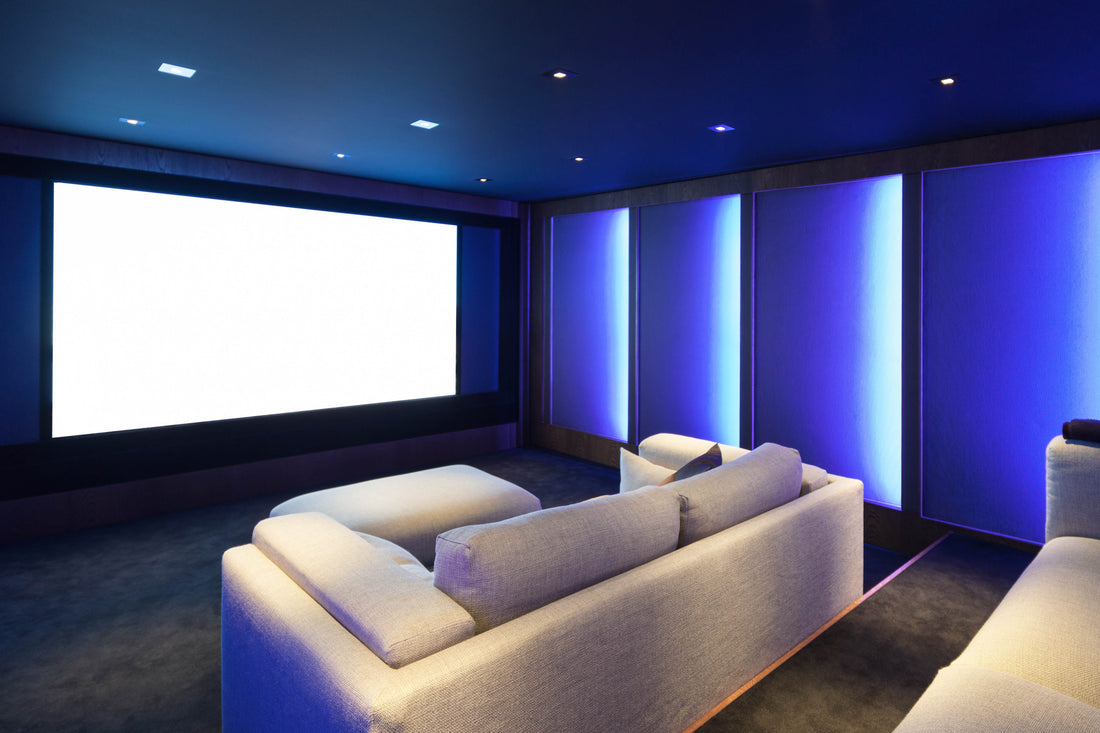Insurance for Home Theaters: What You Need to Know

Going to the movies was a treat. You could indulge in oversized popcorn and candy and be inspired, moved, and entertained with stunning visuals and booming sound. It was a time you could have fun without distraction.
And it’s an immersive experience that’s sorely missed during the pandemic.
So it’s not surprising that one of the stay-at-home activities gaining popularity is installing home theater equipment. Some people are even creating a dedicated home theater room.
If you’re working on recapturing the magic of cinema in your home, your budget should not only include the costs for equipment and, if needed, remodeling, but also costs associated with insurance.
We’ll review what you need to update your home insurer about, whether you have new build home insurance or insurance on an existing home.
The Benefits of a Having a Home Theater
We’ve baked bread, learned French, painted rooms, powered through Zoom meetings, and home-schooled our kids while being quarantined over this past pandemic year. Can we have some fun now?
Enhance Sights and Sounds
There are several benefits of projector screens over televisions — even 80-to-90-inch ones. In addition to improved picture quality, you can size the screen as big as your wall (and have the flexibility to hide it when you’re not using it), and it’s actually more comforting to your eyes to fill a big space. So buy a quality home theater projector.
And a home theater speaker system is the ultimate way to enhance audio in your home, with a richer sound, a more authentic feel, and a more appealing experience.
Decrease Cabin Fever
People still crave larger-than-life experiences, and with safety and cost concerns, not to mention availability, home theaters are replacing in-person live events.
So in addition to recreating the cinema experience, you can also feel like you have front-row tickets to concerts and sporting events. You can take your video games to a whole new level too. Your gaming time will be enhanced with larger, crisper imagery and realistic surround sound.
Home Theaters Can Increase Home Value
Given the necessity and now popularity of stay-at-home activities, safely recreating the cinema experience in your home can help when it comes to selling your home.
While it’s not a major determining factor, a home theater can help your resale value, especially if you’re selling a home in a high-end neighborhood, and your home theater has exceptional technology as well as seats that raise or recline.
Home theaters are trending as an in-demand luxury amenity, and they’re appealing to buyers looking for their dream home who will pay a bit more for that feature. While Hollywood is taking home theaters to the extreme with outrageous screening rooms, as detailed in a recent Forbes article, you don’t need to spend millions of dollars for your home theater to attract buyers.
How Home Theater Space Impacts Insurance
Whether you’re expanding a room, adding to an existing room, or renovating a room to create your dedicated home theater, you need to update your insurance company. Without increased coverage, should a disaster occur, any improvements you’ve made won’t be covered.
Insurance for Adding a Room
Home square footage is one of the factors used in determining your home insurance rate. When you add square footage, you’re adding more value to your home, which will cost more to insure because there’s more space to repair if it were damaged.
Your rate will increase in accordance with the new square footage.
Insurance for Finishing a Room
If you plan to finish your basement to hold your home theater, you need to know the differences between what is semi-finished and finished in order to properly be up to code and to recoup your full return on investment if you sell.
A basement is finished if it includes an electrical system, heat, finished floors, an accessible entrance/stairway, level ceilings, and finished walls.
A finished basement will increase the value of your property by 70 to 75 percent of what you spent on improvements. And while you’re not increasing square footage, you are increasing the value of your home, so you also need to increase the cost of your coverage.
Also get a permit to finish your basement. Your insurance company may not pay on a claim if you finish a basement and there’s no record of it.
Insurance During Construction
You’ll most likely be living in your residence during a room addition or an existing room expansion, so there will be no additional coverage needed beyond the standard homeowners insurance policy.
Your existing personal property coverage will protect against damage to your home’s dwelling or structure while it’s under construction, as well as protect your belongings from potential damage during the project. And your existing liability coverage will protect against bodily injury or property damage claims made by third parties, such as contractors and other workers, while on your property.
But check that any licensed contractors who work on your home carry the proper insurance. They need to have liability insurance in case they accidentally damage or destroy your property or injure you or another owner of the property while working, and you decide to sue.
They also need to carry inland marine insurance, which protects their equipment that’s transferred between job sites. They usually carry builder’s risk insurance as well to protect their materials. And they must be covered by workers’ compensation coverage in case they’re injured due to routine job-related activities during a construction project.
How Home Theater Equipment Impacts Insurance
Whether or not you’re adding a room, you should check in with your home insurance agent regarding your home theater equipment.
Personal Property Coverage for Home Theater Equipment
While there is no specific “home theater insurance,” you do have a few options from which to choose regarding your insurance.
There is coverage for electronics under standard home insurance policies against disasters listed in the policy such as fire, lightning, and wind. Your policy also covers theft, which is good since electronics are among the top items stolen during home burglaries, according to a Bureau of Justice Statistics special report.
But depending on your coverage and your equipment, you may not be satisfied with basic coverage. There are limits to what a standard policy will cover for certain items such as electronics, as well as jewelry, silverware, and collectibles.
Ask your insurance company what the limits are. You want to make sure these items are properly covered.
You could raise the liability limit on your policy. Or you could purchase a special personal property floater or an endorsement. With this, you can insure valuables individually or as a collection, with significantly higher coverage limits.
To help your insurance agent determine the appropriate coverage, provide an inventory of your home theater equipment. For each item, have a description, an estimated value, the purchase date, a serial number, and a receipt. Photos or video would be even better.
Don’t forget to include all of the items you purchased for your home theater room, including plush seating, sound speakers, surge protectors, storage cabinets, and CDs.
This isn’t information overkill; it’s actually what you should share with your home insurer as part of your entire home inventory. It makes filing an insurance claim easier and makes sure you get your money’s worth out of your insurance premiums.
Also make sure you know whether your possessions are insured for replacement cost coverage or actual cash value. A homeowners insurance policy with actual cash value coverage typically determines value by taking the cost to replace your personal belongings and subtracting depreciation factors, such as age or wear and tear.
Replacement cost is just what it says — it would cover replacing the items. Replacement cost coverage is about 10 percent higher than actual cash value coverage, but it’s generally worth the investment.
Once you’ve squared away home insurance changes, then fire up the screen, crank the sound, and kick back and enjoy the peace of mind knowing you’re protecting all that time, effort, and money you’ve put into creating a killer home theater.








